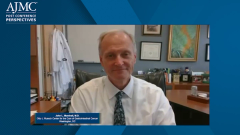
Development Challenges in Microsatellite Stable mCRC
Dr Marshall discusses challenges associated with microsatellite stable metastatic colorectal cancer.
Episodes in this series

John L. Marshall, MD: In this trial, you’ve got 2 different kinds of drugs. The PD-1 drug, which we’re used to, but most folks know about, CTLA-4. Other drugs are approved that target CTLA-4. But this product in this study was a modification, a sort of different approach to that. So the thought here was that it may work better or differently. But the real thing I’d like to come to around this is that we don’t really understand why some people are benefiting and some people are not with these immune therapies. And because the patients who benefit [tend to] benefit dramatically, we really ought to figure out how to understand and maybe expand the number of people who are benefiting. I keep coming back to the microbiome and other patient characteristics, which may be stimulating or interfering with our immune therapy responses. So I am ever hopeful that these studies will ultimately yield a better understanding of how we can help control the immune system to extend these benefits to more patients.
I think one of the negatives I could talk about in drug development in colorectal cancer is we are in kind of a space race. So instead of methodically going through the science, we just try this and see if it works. If the rocket launches, it launches. If it doesn’t, we go to the next thing and sort of try [it], and we’re not learning as much as we should because we’re competing against one another as well.
One of the biggest issues that we have with immunotherapy in these cold tumors is why? Why won’t it work as well [as it does] in hot tumors? And how do we take hot tumors and make them hotter, if you will? We don’t know. We think it might be a microbiome. There may be other things that are in play here, but we do think we’ll be able to do it. Because we’re competing against one another, this group is trying this, this group is trying that. And it’s not a…coordinated effort. This is the free world and the open market for this. I think we’re missing opportunities to learn. My hope is that with continued investment and continued focus, we will indeed figure out why this is working or not and move these forward to more patients.
Transcript edited for clarity.
Newsletter
Stay ahead of policy, cost, and value—subscribe to AJMC for expert insights at the intersection of clinical care and health economics.









